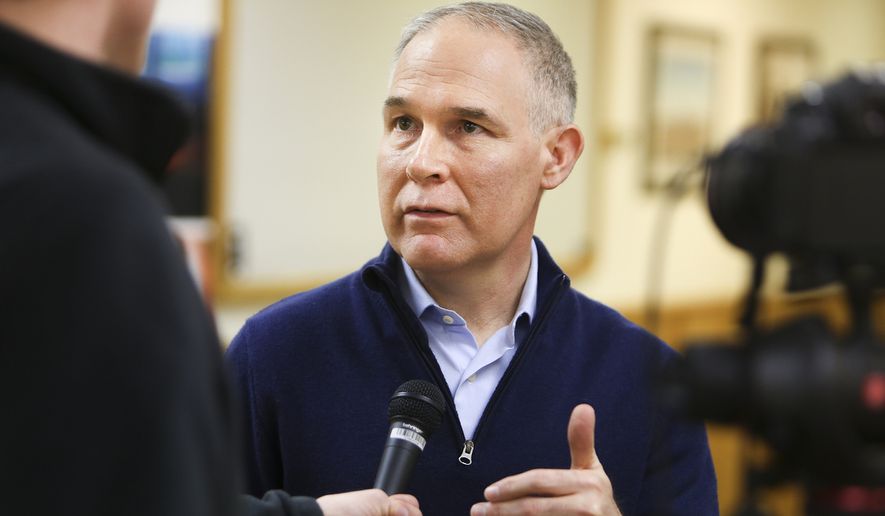In a move that could upend the U.S. auto industry and spark a bitter legal fight with states such as California, the Trump administration said Monday that it will scrap Obama-era fuel economy standards and effectively cancel the looming requirement that all vehicle fleets average more than 50 miles per gallon by 2025.
Environmental Protection Agency Administrator Scott Pruitt said the program, known as Corporate Average Fuel Economy, or CAFE standards, fell victim to politics during the Obama administration as officials sought to take dramatic action against climate change.
He said his predecessors at the EPA rushed through rules governing fuel economy for model years 2022 through 2025 without fully understanding their potential consequences, and that it’s now clear those rules simply aren’t realistic.
The decision represents a major defeat for green groups and other backers of the program, which was one of the most sweeping and lasting environmental actions of the prior administration.
“The Obama administration’s determination was wrong,” Mr. Pruitt said in a statement. “Obama’s EPA … made assumptions about the standards that didn’t comport with reality, and set the standards too high.”
The announcement also marks a turning point for how the government handles fuel economy for cars and light trucks, and could slow what had been a steady climb toward more efficient vehicles on U.S. roads. Car manufacturers, though, insist that cleaner cars will continue to roll off assembly lines.
The current iteration of the CAFE program began with 2012 models and was the result of intense negotiations between the Obama administration and automakers. Although the benchmarks will remain in effect through 2021, the next phase — in which all automakers would have had to ensure that their vehicles averaged about 54.5 mpg — was seen as the most difficult to achieve.
Supporters said it would result in a dramatic reduction in harmful tailpipe emissions. Critics argued that it was a misguided federal mandate that pushed consumers toward electric cars or other vehicles that they couldn’t afford or simply didn’t want.
Auto industry groups praised the about-face and vowed to work with Mr. Pruitt to rewrite the standards in a more realistic way. The EPA chief said he intends to immediately begin work on a replacement program, though it’s unclear when or if such a plan will materialize.
“Consumer research shows that the monthly payment is the top concern when car shopping. So, to ensure ongoing fuel economy improvement, the wisest course of action is to keep new vehicles affordable so more consumers can replace an older car with a new vehicle that uses much less fuel — and offers more safety features,” the Alliance of Automobile Manufacturers said in a statement.
Environmentalists, on the other hand, called the move another favor from Mr. Pruitt for the oil industry, which has a vested interest in ensuring American vehicles continue relying on liquid fuels.
“These rollbacks from Scott Pruitt mean Americans will pay more at the pump while our air gets dirtier, just so Pruitt can help the corporate lobbyists and polluters who give him favors and marching orders,” said Michael Brune, executive director of the Sierra Club.
“Pruitt’s decision to side with Ford and the Auto Alliance rather than the overwhelming majority of Americans who want these clean car standards should come as no surprise as this is an administrator who focuses solely on what’s best for corporate polluters, not the public. But make no mistake, we will continue fighting back to protect these standards and the health of our communities,” he said.
Mr. Pruitt’s decision, which he will discuss at length Tuesday during a speech at a Virginia auto dealership, sets up what could be a landmark court battle between the federal government and a coalition of states.
Under current law, California has the authority to establish its own fuel economy standards. Those state standards were aligned with federal thresholds under the Obama-era program, but Monday’s move puts the two sets of rules in direct conflict.
California has said it has no plans to change its own standards, and the state wields a great deal of influence over the issue because it accounts for roughly 12 percent of all vehicle sales nationwide.
“The Trump administration’s assault on clean car standards risks our ability to protect our children’s health, tackle climate change, and save hardworking Americans money,” California Attorney General Xavier Becerra said in a statement Monday.
“My team is currently reviewing the EPA’s determination and working closely with the California Air Resources Board. We’re ready to file suit if needed to protect these critical standards and to fight the administration’s war on our environment. California didn’t become the sixth-largest economy in the world by spectating,” he said.
The EPA said it is re-examining California’s waiver, suggesting it could be poised to try to eliminate the state’s legal authority to set its own standards.
“Cooperative federalism doesn’t mean that one state can dictate standards for the rest of the country. EPA will set a national standard for greenhouse gas emissions that allows auto manufacturers to make cars that people both want and can afford — while still expanding environmental and safety benefits of newer cars,” Mr. Pruitt said.
• Ben Wolfgang can be reached at bwolfgang@washingtontimes.com.




Please read our comment policy before commenting.